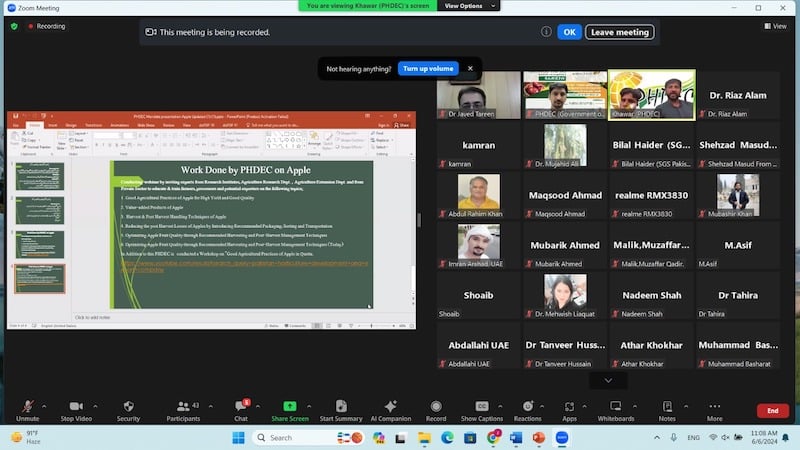PHDEC Pre-Season Seminar and Mango Bagging Initiative Boost Pakistan’s Mango IndustryMultan, 29-5-2024 – The Pakistan Horticulture Development & Export Company (PHDEC), committed to advancing the horticulture sector, has initiated the Mango Bagging program in Sindh and Punjab, offering substantial commercial benefits. PHDEC distributed approximately 70,000 bags in Sindh while about 80,000 bags in Multan among the progressive mango growers for the season 2024. The Mango Bagging initiative, which began as a pilot in 2023 with the distribution of 150,000 bags in Sindh and Punjab, received positive feedback for enhancing fruit quality and appearance. This mango bagging technique, widely practiced by mango-producing countries, has proven highly beneficial. It enhances the fruit’s visual appeal, reduces the need for pesticides, and protects against insects and pests, including fruit flies, which are quarantine concerns. Ultimately, it improves overall fruit quality.In addition, PHDEC organized a Mango Seminar in collaboration with the Mango Research Institute (MRI) Multan, focusing on enhancing mango quality, minimizing post-harvest losses, and promoting mango bagging SOPs. Mangoes, a major fruit crop in Pakistan’s horticulture sector, are harvested from End May to September each year. The seminar aimed to educate farmers, processors, and exporters, enhancing their understanding of best practices and technologies. Experts discussed standard harvest, post-harvest handling, processing, and packing procedures in detail during the seminar.Despite being the world’s fifth-largest mango producer with the annual production of about 1.8MMT, Pakistan exports only 6-7% of its fresh mangoes. The bagging initiative seeks to boost exports by improving fruit quality, making Pakistani mangoes more competitive in high-end international markets.Mr. Athar Hussain Khokhar, CEO of PHDEC, underscored the importance of the pilot project and stressed the need for collaboration with stakeholders to improve mango quality, increase market share, and enhance exports to premium markets.Keynote speaker Mr. Abdul Ghaffar Grewal, former Director of MRI, opened the session with an in-depth presentation on managing mango orchards in the context of climate change. He highlighted the importance of protecting the mango plant’s stem from sun exposure, detailed the irrigation cycle’s role in minimizing fruit drop, and emphasized post-harvest care for next year’s yield. Mr. Grewal provided a comprehensive guide on Good Agricultural Practices to maintain plant health, which is crucial for high-quality fruit and yield. He also shared detailed nutrition and pest management plans with the growers.Dr. Javed Iqbal, a Senior Scientist from the Mango Research Station (Shujabad), discussed mango orchard management and the benefits of mango bagging for yield and quality. His presentation covered the maturity indices of bagged fruit and stressed the importance of harvesting only mature fruit for optimal quality. Dr. Iqbal also highlighted the commercial advantages of mango bagging, such as reducing post-harvest diseases and damage, preserving fruit color, decreasing the need for pesticides, and protecting against pests like fruit flies. He recommended a bagging duration of 30-45 days and provided detailed post-harvest management practices.Dr. M. Amin, Associate Professor in the Department of Horticultural Sciences at IUB, detailed harvesting, post-harvest handling, and processing methods. He explained de-sapping techniques and shared SOPs for hot water and vapor heat treatments. Dr. Amin also discussed the maturity indices for Sindhri, SB Chaunsa, and White Chaunsa varieties, highlighting their role in proper ripening and extending the shelf life of mangoes.Mr. Saqib Ali Akeel, Secretary of Agriculture for South Punjab, and Mr. Raza Salik, Director of MRI, appreciated PHDEC’s initiatives, expressing optimism about the positive impacts on growers and Pakistani mango exports.Mr. Khawar Nadeem, Manager of Agri Products at PHDEC, thanked the participants for their involvement. He emphasized that PHDEC is a leading public sector organization dedicated to advancing Pakistan’s horticulture sector through innovative initiatives and strategic collaborations. Committed to sustainability and excellence, PHDEC aims to empower growers and exporters while meeting the demands of discerning consumers worldwide.
